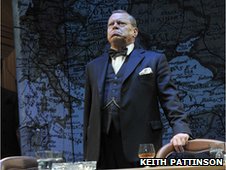
Churchill in the News
BBC Radio 4: Being Winston

November 7, 2011
By Andy Walker
BBC 4 Today Programme
BBC.COM, Friday 4 November 2011—Richard Burton and Albert Finney are among the actors Warren Clarke will be emulating when he plays Winston Churchill in a new West End production, Three Days in May, but what is it like to take on the role of Britain’s wartime leader.
“I’m a devotee of the man. I think he’s the greatest Englishman probably who ever lived.” So says the actor Robert Hardy, who has played Winston Churchill on no fewer than seven occasions.
Initially Hardy, who had met Churchill while playing in Hamlet with Richard Burton, thought it “an absurd and inappropriate idea” to accept the role.
But after “several very good lunches” with the producer Richard Broke he was, he recalls, “over-persuaded” to take the part.

2025 International Churchill Conference
The result was a magisterial piece of television. In eight hour-long episodes, Winston Churchill: The Wilderness Years, detailed Churchill’s time on the back benches during the late 1920s and 30s, chronicling his dire warnings about the twin dangers of Hitler and appeasement.
Hardy’s charismatic performance was the centrepiece of a narrative that was at once detailed, dramatic and didactic.
The chances are that a series like this, which also starred Sian Philips, Nigel Havers and Edward Woodward, would not be commissioned today.
And Hardy reflects that his own approach to playing Churchill has changed radically over the years. “Having tried desperately hard in the early days on film and on stage to imitate Winston I now don’t do that,” he says.
“I have his sound so much in my head that when I read his words something, I think, of him, echoes back and it makes people think of him. I sort of evoke him now.”
But Robert Hardy is just one of a host of actors who have played Britain’s wartime leader.
Indeed, the first big screen depiction came in 1935’s Royal Cavalcade, where C M Hallard took Churchill’s part, a full five years before the man himself entered Downing Street as Hitler’s forces rolled across western Europe.
Visit the BBC.COM to listen to interviews with the actors
“Churchill has not only had the most biographies written about him but probably the most portrayals: with a list of 105 on TV and film, as well as many more on stage and radio” says Michael Kelion, a former vice Chairman of The Churchill Centre in the UK.
These range from Simon Ward’s celebrated performance in Young Winston to the bizarre satire of Winston Churchill: The Hollywood Years, which saw Christian Slater play the role as a gung-ho American GI.
He has even been seen facing down the villainous Daleks in an episode of Doctor Who, courtesy of that stalwart of stage and screen, Ian McNeice.
More recently, Timothy Spall’s cameo in The King’s Speech was dismissed by the Daily Telegraph as akin to “a distended bulldog who’s been chewing wasps”.
The latest play to feature Churchill, Three Days in May, has just opened in London’s West End, marking actor Warren Clarke’s first on-stage appearance in more than a decade.
Clarke is acutely aware of the importance of balancing his performance between impression and impersonation. “It’s difficult,” he admits. “Because if I don’t want to do a voice, they’re going to say ‘where is he?’ So you have to do that. I’m trying to give them the man.”
The Irish actor Brendan Gleeson, who won an Emmy for the 2009 TV drama Into The Storm, had his own personal battle with the part. “I had to get the idea of him as a hero out of my head,” he told one interviewer. “In fact, I couldn’t sleep properly until I had made that decision.”
Having played the Irish republican Michael Collins – who faced Churchill across the negotiating table – in the 1991 drama, The Treaty, “I knew from that how it felt to be on the other side of his wrath”.
Conservative peer Lord Dobbs who, as Michael Dobbs, was a seasoned Westminster insider as well as the author of the House of Cards trilogy, says Churchill’s instantly-recognisable tones present a particular problem.
“It’s very difficult, actually, to portray Churchill,” he told the BBC’s Front Row.
“Because if you listen to the recordings of him, he does have a voice which is incredibly slurred. What you should try to do is to capture the heart and soul of a character. Which, of course, is much more than a simple accent.”
It is not just the nature of the portrayal of Churchill which poses questions. Writers have, in recent years, tended to reject either caricature representations of the wartime leader, as well as mere hagiographies, in favour of a more realistic approach to the man himself.
Ben Brown, writer of Three Days in May, has recreated what he calls Churchill’s “wobble” in May 1940, claiming that he considered, for a moment, whether to negotiate peace terms with Hitler through Mussolini.
Hugh Whitemore, who wrote both Into The Storm and the earlier The Gathering Storm, which starred Albert Finney, sought to create a rounded character, emphasising Churchill’s temper and black moods as well as his wit and mercurial energy.
As he told one interviewer: “He’s a marvellous person for a dramatist to write about. He’s almost an everyman.”
©BBC Radio 4. All Rights Reserved.
Subscribe
WANT MORE?
Get the Churchill Bulletin delivered to your inbox once a month.



